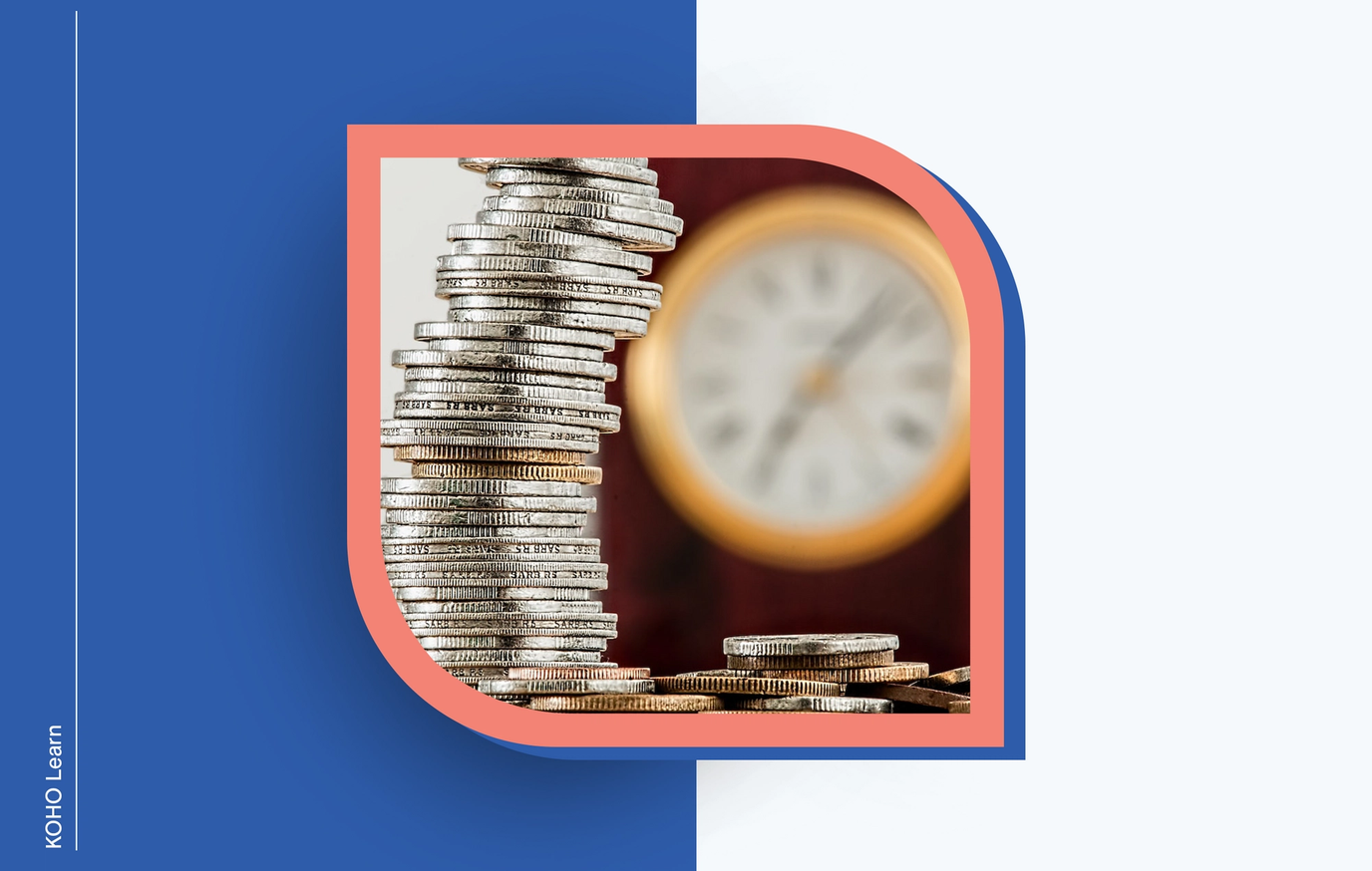Back
What's the safest way to save money during an economic downturn?
5 min read

Written By
Dan Bucherer

Rounding it up
An economic downturn is a period of declining economic activity that often makes items more expensive, including credit.
It makes sense to save money during downturns, using savings accounts, GICs, and even the market.
You can also save money by paying off your debts, bargain shopping, and exploring local buy nothing groups.
In the last couple of months, it’s become a lot more difficult to watch economic news; high inflation, ballooning interest rates, and a slowing global economy have made tuning into your local nightly news stressful.
More than ever, you might be feeling the need to conserve your resources in case things get worse and you need the capital. We often hear the phrase, “put your money under your mattress,” but keeping all your cash in your bedroom likely isn’t the safest way to hold onto your dough. So, what should you do with your money during a downturn?
We’ll take a look and also highlight some of the strategies you can use to maximize your savings in an uncertain economic climate. We’ll also look at some things that you might want to put off until the economy starts heading back in the other direction.
Economic Downturn…what?
Yep, it’s a fairly vague set of words. What exactly is an economic downturn anyway? Well, an economic downturn is two words where one will do: recession, which is a period of declining economic performance – metrics like production, employment, income, and wholesale trade are depressed.
In short, companies are doing less business, people are making less money compared to what it costs to buy things, and as a result, economies stop growing. There are whole books written about what causes economic recessions – and anyone who says they have the definitive answer is deluded. In short, economists have a lot of theories about what causes recessions, and in reality, there's likely a mix of reasons.
Some economists point to sudden spikes or drops in the price of raw goods as the culprit. For example, if the price of oil spikes, everything that uses oil gets more expensive, from filling your car with gas to filling the tanker that brings your new television to port. Even items that just have petroleum products in them, like plastics, go up in price.
Another theory is that an increase in credit is to blame. When consumers take on more debt than they can handle, they end up purchasing less because their income is going to servicing that debt. This also affects businesses as well, which have to take out more debt to stay afloat when receipts go down.
So, what’s causing this economic downturn? Just like the others in history, a lot of different things. Recessions are a natural, albeit uncomfortable, part of a normally functioning global economy.
As you probably expected, COVID has something to do with it. During the pandemic, many people lost or quit their jobs, and others began working remotely. After the pandemic, despite high wages and lots of available employment, people decided not to return to work or return in a more limited capacity. Those who were able to work remotely didn’t return to the office or did so in a limited capacity. This meant that businesses that rely on weekday walk-in traffic suffered.
Add to this supply chain issues and the government infusion of cash that flooded the economy in an effort to help households stay afloat, and you’ve got yourself the perfect storm for a recession.
Fewer people are working, and businesses can’t get workers and thus do less business. People have lots of cash, but items are scarce due to supply issues, driving prices up through inflation. As companies continue to rely on less business, they hire fewer workers and, well, you get the picture.
Saving money
The pandemic put a lot of Canadians on the defense. Whether they lost jobs or had to adapt to lifestyles with kids at home, everyone felt the pinch as COVID took over the country.
Interestingly, however, the savings rate among Canadians during the pandemic was high. The average Canadian saved more than $5,000 during the pandemic, for a nationwide total of $212 billion. The average savings rate jumped from 1.3% of disposable income to nearly 15%. In short, Canadians have some fairly significant savings, which is good news for households nationwide.
But how can you save money? And where should you keep it? Well, there are tons of different options for you to choose from. Before we get into which option might be best during an economic downturn like the one we’re plodding through, let’s take a quick look.
Your mattress
Or the coffee can above the stove or in that disused corner of the basement where the Christmas decorations collect dust. There are plenty of Canadians who squirrel away their savings at home, hiding it in safes or obscure places. There are two significant things wrong with saving your money around the house. First, if you’re saving cash in the house and your house burns to cinders or gets flooded, your hard-earned dollars will likely go along with the flames and water. Not ideal.
Second, the money sitting in the attic with your moldering yearbooks from high school isn’t doing anything for you. There are plenty of ways you can make money just by parking it in various vehicles. No, not your car – we mean accounts and bonds. Read on.
Savings accounts
This is the most common way Canadians save money and the easiest to manage. When you open a chequing account with a bank, you can also quickly and easily open a savings account.
You can automate part of your paycheck to go directly into this account, so you never have to worry about saving – set it and forget it. Having and maintaining a savings account is an important part of your financial equation.
The downside with savings accounts, however, is that your money really isn’t doing all that much work for you either. Yes, it’s safe because it’s not in the market, and yes, banks will pay you interest for keeping your money with them.
With KOHO Save, you can earn up to 4.5% interest on everything in your spending account.
Guaranteed Investment Certificates (GIC) / Treasury Bills
A GIC is a product that provides a fixed payment and return at the end of a specified period. Sounds like a savings account, right? There’s an important difference. You aren’t able to access your money during the defined period without being charged a penalty. Treasury bills, also called T-bills, are similar to GICs but are offered by governments to raise capital. Yields on both types of products are similar to savings accounts.
Invest in the market
Seems counterproductive, but if you invest in the market smartly, your savings can grow even during a recession. You’ll want to make sure your investments are diversified, meaning you’ve got lots of different types of stocks and bonds in a lot of different types of industry.
Additionally, consider shifting some of your investments into safer areas, like the US dollar or commodities. Gold, silver, and other precious metals are (at least historically) always valuable.
So what’s best in an economic downturn?
The best savings option for you during an economic downturn should be determined by two factors: your risk tolerance and how much you can spread out those savings. John Boggle, founder of Vanguard and creator of the index fund, said, “if you’re not willing to lose 20% in the market, you don’t belong in the market.” His main point is that you better be comfortable with the way you’re saving your money. If you’d prefer to hold every single cent, then a savings account or GIC may be best for you. If you’re willing to lose a bit, then the market could be perfect.
The second part here is spreading out. It’s always smart to have a robust savings account that has enough cash for an emergency fund as well as your savings. Once you’ve established that, think about how you can spread those savings out so you can both hold onto your pennies and make a few bucks.
What about saving generally? How can I just simply save money when spending?
Great question, both in a downturn, and every day. There are a few key things you can do to save your cash.
Pay off debts
When economic downturns hit, more often than not, credit becomes more expensive and interest rates go up. That means your debts can become more expensive if they do not have fixed rates. Pay off your credit cards and any loans you’re able to. This is often preferable to increasing savings because the amount you’ll pay in interest is almost always more than what you can recoup with savings interest.
Bargain shop
Sure, there are times when you want that expensive, imported olive oil for that Italian dish you make, but really, won’t the standard extra virgin you can get in the grocery store work? Avoid name brands when you can. Store brands can save you quite a bit of money and guess what: most of them are made by the same folks making the name brands.
Buy used & buy nothing
There are plenty of deals to be had out there if you know where to look. Social media, Craigslist and your neighbourhood listserv will often feature folks selling items for reasonable prices. If you need new appliances, consider restaurant auctions. Most communities now have something akin to a buy nothing group. Folks will post some items they have for free and offer them to the community.
Don’t panic & don’t try to time the market
The market is cyclical, and what goes down has historically, eventually, gone up. Yes, it won’t be that comfortable for a bit, but you can rest assured that more often than not, prices will come down (or wages will go up), and you’ll once again be enjoying a roaring economy. Most importantly, don’t try to deduce when this turnaround will happen. Continue along your savings and investment path as you would normally.

About the author
Dan is a runner and writer living in the Washington, D.C. area, where he currently works for a financial services trade association as the Communications Director.
Read more about this author